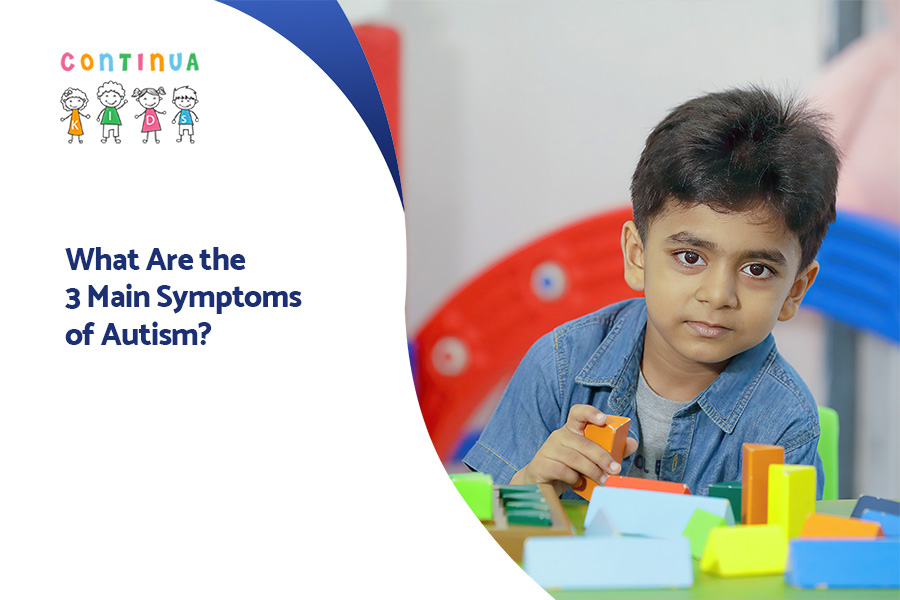
What Are the 3 Main Symptoms of Autism? Let’s Talk
We often hear about autism and how children can be affected by it. Have you ever thought about what autism is exactly? Have you seen any symptoms of someone? Or are you confused about it totally okay? Let’s break it down in the simplest way possible and chat about the three main symptoms of autism. Believe us, you’ll completely understand everything at the end of this. Let’s get started!
What Is Autism?
Autism, or Autism Spectrum Disorder (ASD), as it is usually designated, refers to a deficit in how a person thinks, converses, and behaves. The term “spectrum” is particularly useful here because it reveals autism varies greatly for each individual. Some individuals with this disorder can talk but fail to understand emotions; others may be silent.
Now we’re going to the three main symptoms of autism and then come up with actual definitions of key points that tell doctors and teachers that a child might be autistic.
Symptom 1: Challenges with Communication
Communication is the art of sharing thoughts and ideas through spoken words. This is one of the reasons why those with autism have a hard time. Let us explain why.
Talking:
- Might not talk at all.
- Could repeat the same words or phrases (called echolalia).
- Sometimes use a unique way of speaking.
Understanding:
- Struggles with getting jokes or sarcasm.
- Might find it hard to follow instructions.
Body Language:
- Avoids eye contact.
- Might not understand what a smile or frown means.
Here’s a quick table to show what communication challenges might look like:
| Type of Communication | What It Could Look Like in Autism |
|---|---|
| Talking | Speaking in short phrases or repeating words |
| Understanding | Not getting jokes or sarcasm |
| Body Language | Avoiding eye contact or not using gestures |
Symptom 2: Repetitive Behaviors and Routines
- Repetitive Movements:
- Hand-flapping.
- Rocking back and forth.
- Spinning around in circles.
- Liking Sameness:
- Eats the same breakfast every day.
- Gets upset if plans suddenly change.
- Special Interests:
- Loves one topic so much and learns EVERYTHING about it.
- Can talk about it for hours.
Here’s another table to break it down:
| Type of Communication | Examples |
|---|---|
| Repetitive Movements | Hand-flapping, rocking, or spinning |
| Liking Sameness | Sticking to the same routine every day |
| Strong Interests | Knowing everything about a favorite topic |
Symptom 3: Challenges with Social Skills
- Making Friends:
- Might not know how to start a conversation.
- Feels unsure about joining a group of kids who are playing.
- Understanding Emotions:
- Finds it hard to tell if someone is sad, happy, or angry.
- Might not notice when someone’s feelings change.
- Playing Differently:
- Likes playing alone sometimes.
- Prefers organizing toys instead of pretending with them.
Check out this table to see what I mean:
| Social Skill | What It Could Look Like in Autism |
|---|---|
| Making Friends | Being unsure how to start or keep a conversation |
| Understanding Emotions | Not noticing if someone is upset or happy |
| Playing | KPreferring to play alone or in unique ways |
Why Is It Important to Understand These Symptoms?
Great question. When we understand these symptoms, it helps us be more kind and supportive to people with autism. For example:
- If someone doesn’t talk much, you can be patient and wait for them.
- If a friend loves routines, try not to change plans suddenly.
- If they have a strong interest, ask them about it. They’ll be so happy to share.
Plus, understanding autism can help us celebrate the amazing things people with autism can do. Many of them have incredible talents, like solving tough math problems, creating amazing art, or noticing details that other people might miss.
What Can You Do to Help?
If you have a friend or classmate with autism, here are some easy ways to be a good friend:
- Be Patient:
- Give them time to talk or respond.
- Don’t rush them.
- Learn About Their Interests:
- Ask about what they love.
- Show you’re interested too.
- Be Supportive:
- If they’re upset, try to understand why.
- Stay calm and help them feel better.
- Include Them:
- Invite them to games or activities.
- Even if they play differently, it’s okay.
If you are looking for support and autism treatment for your children, then Continua Kids would be a great choice. That’s true considering all the necessary training and quite the stronghold on making a difference.
